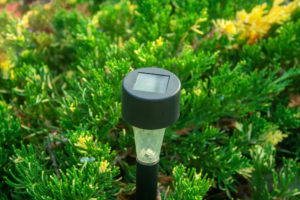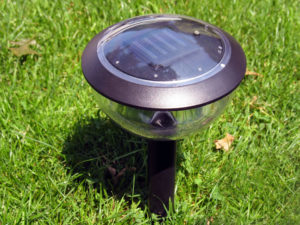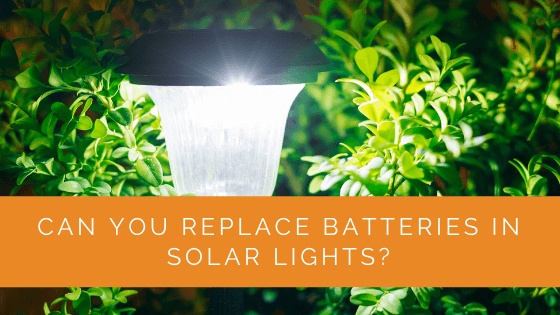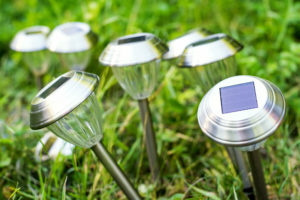Solar energy has been an excellent source of green energy for the last few decades. While it has been popular in various industries, people now use solar energy on more minor scales. If you plan to use solar energy in your home, you can start by installing solar lights.
Solar lights are a very environmentally conscious choice to illuminate your homes. You save a ton of electricity and even money on your energy bills! There are countless benefits of using solar-powered lights at home. However, if you are new to this, you might have many questions about them.
One of the most widely asked questions is whether solar light batteries are replaceable. The short answer to this question is yes, these rechargeable batteries in solar lights can be replaced after prolonged use.
Please continue reading to learn everything you need about solar lights and their batteries.
Contents
- 1 Key Takeaways
- 2 Is It Possible to Replace Rechargeable Batteries in Solar Lights?
- 3 How Do Solar Light Batteries Work?
- 4 Different Types of Rechargeable Solar Light Batteries
- 5 Reasons Behind Failed Solar Lights
- 6 How Do You Replace Solar Light Batteries?
- 7 Tips for Replacing Solar Light Batteries
- 8 Case Study: Effective Battery Replacement for Residential Solar Lights
- 9 Expert Insights From Our Solar Panel Installers About Replacing Solar Light Batteries
- 10 Our Expertise in Solar Lights
- 11 Conclusion
Key Takeaways
- Solar light batteries are replaceable; you can do it yourself without special skills.
- Solar lights convert sunlight into electricity stored in rechargeable batteries, which may need replacement after a few years due to wear and tear.
- To prolong the lifespan of your solar light batteries, keep them clean, replace them regularly, and ensure they have the same specifications as the original batteries.
Is It Possible to Replace Rechargeable Batteries in Solar Lights?
Yes, it is possible to replace solar light batteries at home. You do not need any unique skill sets to do so, either. With a bit of guidance and practice, you will be able to replace solar light batteries all by yourself.
Most solar garden lights and other solar lights come with warranties that last years. However, the chances are that the LED bulb of your solar light will last longer than the batteries in your solar panel. Instead of throwing your solar lights away and replacing the entire set-up, you could replace the battery!
How Do Solar Light Batteries Work?
Knowing how your solar lights and their solar light batteries work is essential first. All solar lights come with solar panels that absorb sunlight to produce electricity. Garden solar lights may have smaller-sized solar panels that can be installed anywhere around your property.
The solar panel is covered with solar cells or photovoltaic cells. These cells take in the direct sunlight and then convert it to energy. The panels have layers of chemicals that undergo reactions to produce electrons.
These electrons result in the formation of electrical energy, which is stored in solar batteries. New batteries have excellent storage capacities and have an average lifespan of about 2 years. Your solar light batteries may endure wear and tear over the years and need replacement.
Old batteries for solar lights work with lower efficiency and may not achieve the desired results. You can then look for replacement batteries for solar lights and change them independently.
All working solar lights have four essential components: LEDs, photovoltaic cells, rechargeable solar light batteries or special batteries, and a charge controller. Your solar lights will be rendered useless without properly functioning all these components.

Different Types of Rechargeable Solar Light Batteries
Most solar panels come with different types of batteries. All rechargeable batteries have a specific lifespan, after which these dead solar light batteries must be replaced. The two commonly seen solar light batteries are Nickel-cadmium (NiCd) and (NiMH) Nickel-metal Hydride.
Both these batteries have unique benefits along with a few downsides. For instance, nickel-cadmium are rechargeable batteries that have a lifespan of a maximum of 2 years. After this, the batteries in your solar lights are rendered useless and need to be replaced.
However, NiCd batteries in your solar light also release harmful toxins. On the other hand, NiMH batteries are better for the environment and the health of those around you. You must check which battery works best for your solar light and choose the right option.
Reasons Behind Failed Solar Lights
Solar lights come with warranties lasting years. However, if you do not care for them, you might replace your old solar lights with new ones. One of the most common reasons behind broken solar lights is dead batteries.
A solar battery is among the essential components of your solar panel and light system. Most solar lights that seem to have stopped working can be revived with the help of a new battery. Outdoor solar lights need to be charged fully during the day.
Without proper charging, these lights will not last you through the night. You can manually switch off the lights during the day to allow your solar panel to recharge completely. These solar panels require at least four hours of direct sunlight to charge the batteries inside.
Solar light batteries are rechargeable and require adequate sunlight to power your LED lights and their light-emitting diode. You can ensure maximum efficiency by keeping your panel clean and positioning it to get the total sunlight.
If your solar light batteries are dead, you will need to test your solar lights first. An excellent way to do so is by switching the solar rechargeable batteries with standard batteries. If the average battery powers the light, your solar lights are perfect.
How Do You Replace Solar Light Batteries?
Solar lights with rechargeable batteries need to be changed and replaced frequently. NiCd batteries only have a lifespan of about 1 to 2 years. You are advised to replace these batteries once every year so that your solar lights work optimally.
Replacing solar light batteries is very straightforward, and you can do it yourself. You should know where the solar light battery is located in the device, for starters. You can then go ahead and unscrew the cover to expose the battery.
A standard solar light battery is usually found under the light bulb itself. You can then unscrew the battery cover with the help of a screwdriver and carefully remove the old batteries. Replace the battery in your solar light with a new rechargeable battery.

Tips for Replacing Solar Light Batteries
Here’s what you can do to ensure safety while replacing your solar light battery.
- Make sure that your surroundings are clean and dry.
- Make sure that the light switch is off when you replace the battery.
- Do not plug the device into a power outlet while switching batteries.
- Make sure you are using the correct solar light rechargeable batteries.
- Switch the lights on after securing the battery casing and position the new battery.
Nickel Cadmium and Nickel Metal Hydride
You can replace nickel-cadmium batteries with nickel-metal hydride batteries. While you are advised to stick to the type of batteries used in your solar lights, you can switch to a nickel-metal hydride battery.
All you need to do is ensure the new battery has the same voltage and size. After replacing it with Ni MH batteries, check whether all lights work correctly.
Replacing Nickel Cadmium with Lithium-Ion batteries
Replacing your nickel-cadmium battery with nickel-metal hydride batteries is a very safe switch. However, the same is invalid if you want to change your solar batteries to lithium-ion batteries as they do not have the same voltage.
A lithium-ion battery has a high discharge voltage, which is incompatible with most NiCd solar lights. This difference in their voltages can destroy your garden solar lights or any other solar light over time. The switch is possible, but it is not advised.
Tips to Prolong Your Solar Light Batteries Lifespan
There are many ways to ensure your solar lights last a long time. While you can rely on warranties and the guarantees issued by companies, you can also look after these lights to make them last longer.
Here’s what you can do.
- Keep your solar panels clean and free of dust and debris. Investing some time and effort into maintaining your solar lights is crucial.
- Replace batteries frequently to ensure the quality of your solar light is not degraded and it performs adequately throughout its life cycle.
- Check for issues regularly. You can replace rechargeable batteries with non-rechargeable or regular batteries to see if your lights have any problems.
- Keep replacement batteries handy so you never have to use non-rechargeable batteries.
- After installing the new batteries, discard the old ones at battery recycling points.

Case Study: Effective Battery Replacement for Residential Solar Lights
Background
At Solar Panels Network USA, we emphasize the importance of maintaining and replacing components in solar lighting systems to ensure their efficiency and longevity. This case study showcases our approach to effectively replacing batteries in residential solar lights, highlighting our commitment to sustainability and optimal performance.
Project Overview
A homeowner contacted us with concerns about their solar garden lights, which were no longer providing adequate illumination. The primary objective was to diagnose the issue and restore the functionality of the solar lights through battery replacement.
Initial Consultation and Assessment
Understanding the Problem
We began with a detailed consultation to understand the homeowner’s specific issues with their solar lights. The main concern was that the lights were dim and did not last through the night.
On-Site Inspection
A thorough on-site inspection was conducted to assess the condition of the solar lights. We checked the solar panels for dust and debris, examined the light fixtures, and tested the existing batteries for performance.
Implementation
Diagnosis of Battery Issues
Upon inspection, we found that the solar light batteries were corroded and had significantly reduced capacity, leading to poor performance. The existing batteries were NiCd, which tend to have a shorter lifespan and higher environmental impact.
Selection of Replacement Batteries
Based on our findings, we recommended replacing the old NiCd batteries with NiMH batteries. NiMH batteries are known for their longer lifespan, better performance, and eco-friendly properties. We ensured that the replacement batteries matched the original specifications in terms of voltage and size.
Battery Replacement Process
- Safety Precautions: We ensured the work area was clean and dry and turned off the solar lights to avoid any electrical issues.
- Removing Old Batteries: Using a screwdriver, we carefully opened the battery compartments, removed the corroded NiCd batteries, and cleaned any residual corrosion with a soft-bristle brush.
- Installing New Batteries: The new NiMH batteries were installed, ensuring they were properly seated in the compartments.
- Testing: After securing the battery compartments, we tested the solar lights to confirm they were working correctly.
Results
Improved Performance
Post-replacement, the solar lights demonstrated significantly improved performance. They provided brighter illumination and lasted throughout the night, meeting the homeowner’s expectations.
Enhanced Longevity
The switch to NiMH batteries is expected to extend the lifespan of the solar lights, reducing the need for frequent replacements and lowering long-term maintenance costs.
Environmental Benefits
Using NiMH batteries, which are more environmentally friendly, aligns with our commitment to promoting sustainable energy solutions.
Summary
Our expertise in solar lighting solutions enabled us to diagnose and effectively address the battery issues in the homeowner’s solar lights. By replacing the old NiCd batteries with high-quality NiMH batteries, we restored the functionality and efficiency of the solar lights. This case study highlights the importance of regular maintenance and appropriate battery replacement in maintaining the performance and longevity of solar lighting systems.
Expert Insights From Our Solar Panel Installers About Replacing Solar Light Batteries
Replacing solar light batteries is a straightforward task that can significantly extend the life of your solar lights. Regularly checking and maintaining the batteries ensures optimal performance and longevity of your solar lighting system.
Lead Solar Engineer
Using high-quality NiMH batteries as replacements can improve the efficiency and environmental impact of your solar lights. These batteries tend to last longer and are more eco-friendly compared to NiCd batteries.
Senior Solar Technician
It’s crucial to ensure that the replacement batteries have the same voltage and size as the original ones. Incorrect specifications can damage your solar lights and reduce their lifespan.
Renewable Energy Specialist
Our Expertise in Solar Lights
At Solar Panels Network USA, we’re here to provide you with valuable information and support regarding solar lighting. With our experience and understanding of the solar lighting industry, our team of experts is prepared to assist you in finding the right lighting solution for your needs. Whether you’re interested in improving your outdoor spaces, conserving energy, or adopting a more sustainable approach, we’re well-equipped to help. Please feel free to contact us with any questions or inquiries.
Conclusion
NiMH and NiCd batteries are excellent choices to power your solar lights. If you look after these batteries and invest in taking care of them, your solar light system will last you years. Ensure the new battery you use to replace the old one has the same specifications.
Batteries with varying voltages can negatively affect the quality of your LED light and make them duller. After prolonged use, you will notice a significant drop in the quality of your solar lights. This could eventually end with you having to replace your entire lighting system.
So, invest in frequent and proper replacements and watch your house illuminate!
About the Author
Solar Panels Network USA stands at the forefront of solar energy solutions, driven by a team of seasoned solar engineers and energy consultants. With over decades of experience in delivering high-quality solar installations and maintenance, we are committed to promoting sustainable energy through customer-centric, tailored solutions. Our articles reflect this commitment, crafted collaboratively by experts to provide accurate, up-to-date insights into solar technology, ensuring our readers are well-informed and empowered in their solar energy decisions.


